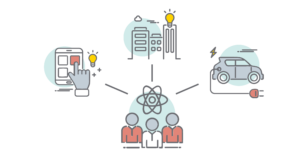The Growing Role of Artificial Intelligence in EV Adoption
As the world accelerates towards a more sustainable future, electric vehicles (EVs) have emerged as a key solution to combat climate change and reduce emissions. However, the transition to electric mobility comes with its own set of challenges. One of the crucial factors driving the successful adoption of EVs is the integration of artificial intelligence (AI) into various aspects of the EV ecosystem. In this article we explore the growing role of AI in electric vehicle adoption and how it’s shaping the future of transportation.
- Smart Charging Infrastructure: AI-powered smart charging infrastructure is revolutionising the way EVs are charged. These systems use real-time data to optimise charging schedules based on factors such as energy demand, grid stability, and electricity prices. By leveraging AI algorithms, EVs can be charged during off-peak hours when energy costs are lower, reducing the strain on the grid and minimising charging expenses for consumers.
- Range Prediction and Optimisation: Range anxiety has been a significant barrier to EV adoption. AI-driven algorithms analyse driving patterns, weather conditions, and individual preferences to predict an EVs remaining range accurately. This information empowers drivers to plan their journeys more confidently and effectively. Additionally, AI can suggest optimal routes and charging stops to ensure a seamless travel experience.
- Personalised User Experience: AI enhances the user experience by tailoring recommendations and features to individual drivers. From adjusting climate control settings to suggesting nearby charging stations, AI algorithms create a personalised environment that makes EV ownership more convenient and enjoyable.
- Fleet Management and Optimisation: For businesses transitioning to electric fleets, AI plays a pivotal role in optimising operations. Fleet managers can use AI-powered analytics to monitor vehicle performance, predict maintenance needs and analyse efficiency metrics. This data-driven approach ensures maximum utilisation of EVs, reduced downtime, and cost savings.
- Energy Grid Integration: As EV adoption grows, the energy grid faces new challenges. AI technologies can balance EV charging demands with grid capabilities, avoiding overloads during peak periods. Vehicle-to-grid (V2G) technology, enabled by AI, allows EVs to feed back excess energy into the grid, contributing to grid stability and creating revenue opportunities for EV owners.
The integration of artificial intelligence into the electric vehicle ecosystem is transforming how we view transportation. By optimising charging, enhancing user experiences, and enabling efficient fleet management, AI is driving the widespread adoption of electric vehicles. As technology continues to evolve, we can anticipate even more innovative solutions that will make EV ownership accessible, convenient, and sustainable for all.
Stay tuned as EV8 Technologies continues to lead the way in leveraging AI for electric vehicle adoption, making the transition to electric mobility a seamless and exciting journey.

